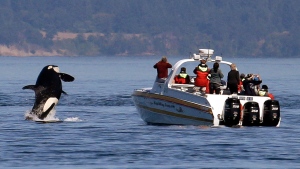British Columbia has implemented new measures to protect the endangered southern resident killer whales. These measures include speed restrictions and fishery closures in certain areas.
The Department of Fisheries and Oceans (DFO) announced the new measures on Thursday, stating that they are necessary to protect the dwindling population of southern resident killer whales. These whales, which are found in the waters off the coast of British Columbia and Washington state, are considered endangered under the Species at Risk Act.
One of the measures being implemented is a mandatory speed restriction for all vessels in the Haro Strait, Boundary Pass, and the Strait of Juan de Fuca. These areas are known to be important foraging grounds for the southern resident killer whales. The speed limit will be set at 7 knots for all vessels over 20 meters in length, and 11 knots for all other vessels.
In addition to the speed restrictions, the DFO has also announced the closure of certain fisheries in the same areas. This includes the commercial and recreational salmon fisheries in the Strait of Juan de Fuca and the southern Gulf Islands. These closures will be in effect from June 1st to October 31st, 2021.
The DFO has stated that these measures are necessary to reduce the noise and disturbance caused by vessels, which can disrupt the feeding and communication of the southern resident killer whales. The noise from vessels can also interfere with the whales’ ability to locate their prey, which can have a negative impact on their overall health and survival.
These new measures have been met with mixed reactions from the fishing industry. While some have expressed concerns about the impact on their livelihoods, others have acknowledged the importance of protecting the endangered whales.
The DFO has also stated that they will be closely monitoring the effectiveness of these measures and will make adjustments if necessary. They have also reminded all vessel operators to be aware of the presence of the southern resident killer whales and to follow all speed restrictions and guidelines.
The southern resident killer whales have faced numerous threats over the years, including pollution, noise pollution, and a decline in their main food source, Chinook salmon. These new measures are a step towards protecting these magnificent creatures and ensuring their survival for future generations.



